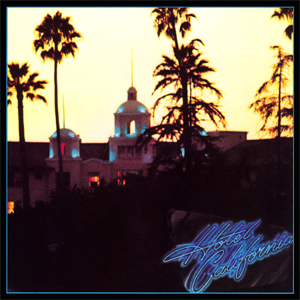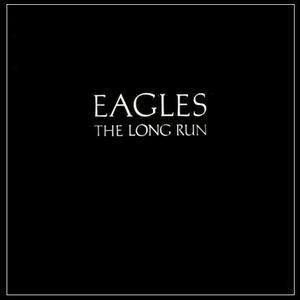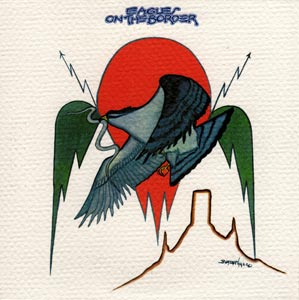Related Research Articles

The Eagles are an American rock band formed in Los Angeles in 1971. With five number-one singles and six number-one albums, six Grammy Awards and five American Music Awards, the Eagles were one of the most successful musical acts of the 1970s in North America and are one of the world's best-selling bands, having sold more than 200 million records worldwide, including 100 million sold in the US alone. They were inducted into the Rock and Roll Hall of Fame in 1998 and were ranked number 75 on Rolling Stone's 2004 list of the "100 Greatest Artists of All Time". Founding members Glenn Frey, Don Henley, Bernie Leadon, and Randy Meisner were recruited by Linda Ronstadt as band members, some touring with her, and all playing on her third solo album, before venturing out on their own on David Geffen's new Asylum Records label.

Hotel California is the fifth studio album by American rock band Eagles, released on December 8, 1976, by Asylum Records. Recorded by the band and produced by Bill Szymczyk at the Criteria and Record Plant studios between March and October 1976, it was the band's first album with guitarist Joe Walsh, who had replaced founding member Bernie Leadon, and the last to feature founding bassist Randy Meisner. The album cover features a photograph of the Beverly Hills Hotel, taken by David Alexander.

The Long Run is the sixth studio album by American rock group the Eagles. It was released in 1979 by Asylum Records in the United States and the United Kingdom. This was the first Eagles album to feature bassist Timothy B. Schmit, who had replaced founding member Randy Meisner, and the last full studio album to feature Don Felder before his termination from the band in 2001.

"Hotel California" is a song by American rock band Eagles, released as the second single of their album of the same name on February 22, 1977. Songwriting credits go to Don Felder (music), Don Henley, and Glenn Frey (lyrics). The Eagles' original recording of the song features Henley singing lead vocals and concludes with an iconic 2 minute and 12 seconds long electric guitar solo performed by Felder with a Gibson Les Paul Gibson EDS-1275 double neck and Joe Walsh with a Fender Telecaster, in which they take turns of playing the lead before harmonizing and playing arpeggios together towards the fade-out.

Desperado is the second studio album by the American band the Eagles. It was released on April 17, 1973, by Asylum Records. The album was produced by Glyn Johns and was recorded at Island Studios in London, England. The songs on Desperado are based on the themes of the Old West. The band members are featured on the album's cover dressed like an outlaw gang; Desperado remains the only Eagles album where the band members appear on the front cover.

Eagles is the debut studio album by American rock band the Eagles. The album was recorded at London's Olympic Studios with producer Glyn Johns and released on June 1, 1972. It was an immediate success for the then-new band, reaching No. 22 on the Billboard 200 and achieving a platinum certification from the Recording Industry Association of America (RIAA). Three singles were released from the album, each reaching the Top 40 of the Billboard Hot 100: "Take It Easy", "Witchy Woman", and "Peaceful Easy Feeling". The band, starting with this album, played a major role in popularizing the country rock sound.

On the Border is the third studio album by American rock band the Eagles, released on March 22, 1974. Apart from two songs produced by Glyn Johns, it was produced by Bill Szymczyk because the group wanted a more rock‑oriented sound instead of the country-rock feel of the first two albums. It is the first Eagles album to feature guitarist Don Felder. On the Border reached number 17 on the Billboard album chart and has sold two million copies.

One of These Nights is the fourth studio album by American rock band the Eagles, released on June 10, 1975. The album was the band's commercial breakthrough, transforming them into international superstars. In July that year, the record became the Eagles' first number one album on Billboard Top LPs & Tape chart, yielding three Top 10 singles: "One of These Nights", "Lyin' Eyes" and "Take It to the Limit". Its title song is the group's second number one single on the Billboard Hot 100. The album sold four million copies and received a Grammy nomination for Album of the Year. A single from the album, "Lyin' Eyes", was also nominated for Record of the Year, and won the Eagles' first Grammy for Best Pop Performance by a Duo or Group with Vocals at the 18th Annual Grammy Awards in 1976. The band embarked on the worldwide One of These Nights tour to promote the album.

Eagles Live is the first live album by the American rock band Eagles, a two-LP set released on November 7, 1980. Although the Eagles were already in the process of breaking up, the band owed Elektra/Asylum Records one more album and fulfilled that contractual obligation with a release of performances from the Hotel California and The Long Run tours.

"I Can't Tell You Why" is a song by the American rock band Eagles that appeared on their 1979 album The Long Run. It was written by band members Timothy B. Schmit, Glenn Frey and Don Henley. Recorded in March 1978, it was the first song finished for the album and the first Eagles song to feature Schmit on lead vocals. Released as a single in February 1980, it became a Billboard top 10 hit in April, reaching number eight on the Billboard Hot 100 and number three on the Adult Contemporary chart. It was the group's last top ten hit on the Billboard Hot 100.
"Desperado" is a soft rock ballad by the American rock band the Eagles. The track was written by Glenn Frey and Don Henley, and appeared on the 1973 album Desperado as well as numerous compilation albums. Although it was never released as a single, it became one of Eagles' best-known songs. It ranked No. 494 on Rolling Stone's 2004 list of "The 500 Greatest Songs of All Time".

"One of These Nights" is a song by the American rock band Eagles, written by Don Henley and Glenn Frey. The title track from their 1975 One of These Nights album, the song became their second single to top the Billboard Hot 100 chart after "Best of My Love" and also helped propel the album to number one. The single version was shortened from the album version of the song, removing most of the song's intro and most of its fade-out, as well. Henley is lead vocalist on the verses, while Randy Meisner sings high harmony on the refrain. The song features a guitar solo by Don Felder that is "composed of blues-based licks and sustained string bends using an unusually meaty distortion tone."

"New Kid in Town" is a song by the Eagles from their 1976 studio album Hotel California. It was written by Don Henley, Glenn Frey and J.D. Souther. Released as the first single from the album, the song reached number one in the U.S. and number 20 in the UK. The single version has an earlier fade-out than the album version. Frey sings the lead vocals, with Henley providing the main harmony vocals. Randy Meisner plays the guitarrón mexicano, Don Felder plays electric guitars, and Joe Walsh plays the electric piano and organ parts. The song won the Grammy Award for Best Vocal Arrangement for Two or More Voices.

"Take It Easy" is the debut single by the American rock band Eagles, written by Jackson Browne and Eagles band member Glenn Frey, who also provides lead vocals. It was released on May 1, 1972, and peaked at No. 12 on the Billboard Hot 100 chart on July 22, 1972. It was also the opening track of the band's eponymous debut album and has become one of their signature songs, included on all of their live and compilation albums. It is listed as one of The Rock and Roll Hall of Fame's 500 Songs that Shaped Rock and Roll.

"Lyin' Eyes" is a song written by Don Henley and Glenn Frey and recorded in 1975 by the American rock band Eagles, with Frey singing lead vocals. It was the second single from their album One of These Nights, reaching No. 2 on the Billboard Hot 100 chart and No. 8 on the Billboard Country chart. It remained their only top 40 country hit until "How Long" in 2007–2008.

"James Dean" is a song written by Don Henley, Glenn Frey, Jackson Browne, and J. D. Souther, and recorded by the American rock band Eagles for their 1974 album On the Border. It was the second single released from this album, reaching number 77 on the U.S. pop singles chart.

"Take It to the Limit" is a song by the Eagles from their fourth album One of These Nights from which it was issued as the third single on November 15, 1975. It reached No. 4 on the U.S. Billboard Hot 100 and was also the Eagles' greatest success to that point in the UK, going to No. 12 on the charts. Billboard ranked it as the No. 25 song for 1976.

"Life in the Fast Lane" is a song written by Joe Walsh, Glenn Frey and Don Henley, and recorded by American rock band Eagles for the band's fifth studio album Hotel California (1976). It was the third single released from this album, and peaked at No. 11 on the Billboard Hot 100.

"Tequila Sunrise" is a song from 1973, written by Don Henley and Glenn Frey, and recorded by the Eagles. It was the first single from the band's second album, Desperado. It peaked at number 64 on the Billboard Hot 100.

"The Long Run" is a song written by Don Henley and Glenn Frey and recorded by the Eagles. The sound of the song is viewed as a tribute to the Stax / Memphis rhythm and blues sound. It was the title track of their album The Long Run and was released as a single in November 1979. It reached No. 8 on the U.S. Billboard Hot 100 in early 1980. It was the second of three singles released from The Long Run album, preceded by "Heartache Tonight," which reached No. 1 on the Billboard Hot 100 in November 1979, and followed by "I Can't Tell You Why," which also reached No. 8 on the Billboard Hot 100, in the spring of 1980.
References
- 1 2 Ruhlmann, W. "Hotel California". allmusic. Retrieved 2011-07-01.
- ↑ Andy Greene. "Readers Poll: The Ten Best Eagles Songs." Rolling Stone, July 29, 2015.
- 1 2 3 4 Eagles: The Ultimate Guide. Rolling Stone. 2016. p. 93.
- ↑ Runtagh, Jordan (December 8, 2016). "The Eagles' 'Hotel California': 10 Things You Didn't Know". Rolling Stone.
- 1 2 Thompson, D. (2011). 1000 Songs That Rock Your World. Krause. p. 163. ISBN 9781440214226.
- 1 2 3 4 Perone, J. (2012). The Album: A Guide to Pop Music's Most Provocative, Influential, and Important Creations, Volume 2. ABC-CLIO. p. 92. ISBN 9780313379062.
- ↑ Eliot, M. (2004). To the Limit: The Untold Story of the Eagles. Da Capo Press. p. 150. ISBN 9780306813986.
- ↑ Whitaker, Sterling (January 18, 2016). "Top 10 Underrated Eagles Songs". Ultimate Classic Rock. Retrieved 2023-01-09.
- ↑ "The Last Resort by Eagles". setlist.fm. Retrieved January 4, 2023.